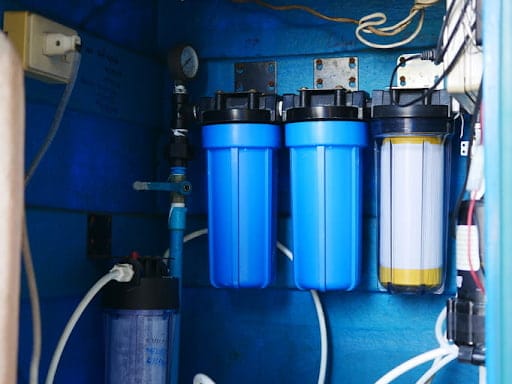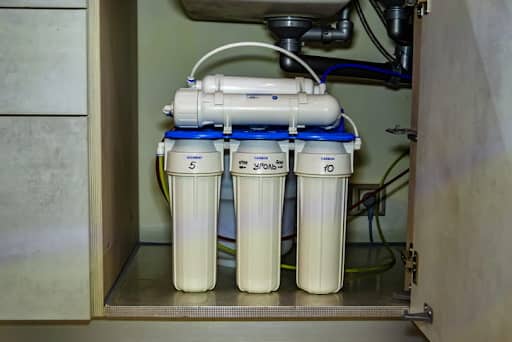
For most business owners, filtered water is a critical aspect of their day-to-day activities. From residential homes to commercial buildings, people rely on filtered water for everyday needs.
There are many ways to filter water, but ask any expert in the field and they’ll tell you that reverse osmosis is the gold standard for both commercial and residential water filtration. A recent study looking at the effects of reverse osmosis found that this method is one of the most cost-effective ways and widely applied systems for water purification.
Backed by science and the experiences of business owners like you, relying on a reverse osmosis water filtration system means you’ll have access to purified water for all your business and personal needs.
So, what exactly is a reverse osmosis water filter, how does it work, and what should you take into consideration if you’re thinking about using this type of water filtration system in your business operations?
At Rain Water Conditioning of Las Vegas, we’re here to help you answer your questions and help you learn more about the best way to get your water filtered to the highest purification levels possible.
Contact us today to learn more about our water-saving reverse osmosis systems and other water purification units.
What is a reverse osmosis water filter?
A reverse osmosis water filter is a type of water treatment process that pulls contaminants out of a water source. Contaminants — including chemical and mineral contaminants — are removed when water is placed under pressure as it moves through a semi-permeable membrane. When water is forced through this membrane, only water molecules are allowed to pass, leaving contaminants behind.
A reverse osmosis system is highly effective in removing contaminants including viruses, bacteria, and protozoa. Common contaminants that are found and removed include metal ions, fluoride, sodium, copper, chromium, lead, and many others. Reverse osmosis can also reduce levels of arsenic, sulfate, calcium, magnesium, phosphorus, nitrate, and other contaminants as well.
How does a reverse osmosis water filter work?
A reverse osmosis water filter may seem complex, but the overall system and operation are fairly straightforward. When water enters the filtration system, it is pushed through a series of filters that work to purify the water. The goal is to allow only purified water molecules to filter through, leaving behind contaminants like viruses, bacteria, minerals, and other chemical contaminants.
Water filtration stages
A reverse osmosis (RO) filtration system typically pushes water through four stages. Depending on the unit, you may have an additional fifth stage.
- Stage one – pre-filtration: The first stage is the sediment filter, also known as the pre-filter stage. This first filtration system helps to strain out large contaminants like sediment, dirt, and silt. This pre-filtration stage prevents larger contaminants from damaging the more critical filters in the coming stages.
- Stage two – carbon filter: A carbon filter is designed to pull out chlorine and other contaminants. This filter is made of granular activated carbon (GAC) which is effective at absorbing certain chemicals, including foul scent-producing chemicals like hydrogen sulfide (think rotten eggs odor). With some reverse osmosis water filters, there is a second carbon filter that water will move through to purify the water further.
- Stage three – semi-permeable membrane: After the carbon filtration process, water will then move into the third, most critical water filtration phase — the osmosis membrane. This semi-permeable membrane allows water molecules to be separated from other microscopic contaminants, including chemicals, bacteria, protozoa, and viruses. The best reverse osmosis water filters will move water through a membrane with a pore size of 0.01 microns. This microscopic pore is incredibly effective and can remove up to 99% of 65 different types of contaminants.
- Stage four – post-filtration: Once all water moves through the semi-permeable membrane, it will then go through the final stage, the polishing system. This polishing system is typically a carbon filter that will ensure any lingering contaminants, including those affecting taste or odor, are removed from the water. After this stage, water will then flow through your faucets, leaving you with highly purified water.
Do I need a reverse osmosis water filter system?
You can never go wrong with having purified water. However, some industries require highly purified water that is passed through a reverse osmosis water filtration system.
Companies that operate in the mechanical, chemical, pharmaceutical, or lumber and pulp industries typically require highly purified water for everyday operations.
If your organization or commercial space falls under one of those categories, it’s important to consider the benefits of a water filtration system and how it can improve your overall business operations.
Along with these specific industries, everyday entities like mom-and-pop retail shops, restaurants, and other public spaces can benefit from a reverse osmosis water filtration system. Having such a system installed in your establishments ensures that you and your customers are using the purest water possible.
Do reverse osmosis water filters help with Las Vegas water?
Hard water is essentially water that is contaminated with minerals like calcium and magnesium. You’ll be able to tell that water is hard because it often leaves a slimy feeling on your hands after you wash them. It also creates a weak lather when used with soap and leaves behind cloudy droplets after the water has dried.
Las Vegas is known to have some of the highest levels of water hardness in the nation, and although hard water is not without its nuances, experts in the field are still contending the impact hard water can have on your health.
According to the Las Vegas Valley Water District, Las Vegas water has a water hardness rating of 278 parts per million or 16 grains per gallon. A level of three to seven grains per gallon is deemed “moderately hard” while the highest rating of 15+ grains per gallon is deemed “extremely hard.” A recent study ranks Las Vegas as the second leading city in the nation with the hardest water (Indianapolis comes in first).
The water in Las Vegas Valley is hard because of where it comes from. When snow melts from the Rocky Mountains and filters into the Colorado River, it picks up calcium and magnesium deposits. This now-hardened water will then make its way to nearby Lake Mead, where the city sources roughly 90% of its water.
Having a reverse osmosis water filter installed in your Las Vegas commercial space allows you to remove these calcium and magnesium deposits so that you no longer have to deal with the nuances of hard water.
Get to know our team and our available services when you schedule a free consultation.
Things to consider before purchasing a reverse osmosis water filter system
There are many benefits to installing a reverse osmosis water filtration system in your commercial space; however, you’ll want to weigh the pros and cons.
Consider space and storage tank/no tank systems
Even commercial-grade reverse osmosis water filtration systems don’t require much space. Most reverse osmosis water filtration systems are small enough that they could fit right under your kitchen sink. However, you’ll need more space if you opt for a reverse osmosis system that comes with a storage tank.
RO systems that come with a tank allow you to have filtered water on demand the moment you turn on the tap. Having that extra storage tank, however, means your system might require a bit more in terms of maintenance.
Nowadays, tankless RO systems are growing increasingly popular due to their improved efficiency. Plus the lack of a tank cuts down on any additional services. Overall, however, whether you go with a storage tank system or tankless, you generally don’t have to worry about sacrificing too much space.
Required maintenance
Perhaps the most difficult part of owning a reverse osmosis water filtration system is the maintenance your system will require. To stay effective, your RO filtration system needs regular maintenance to stay operating as it should.
Routine maintenance includes filter replacements of sediment, carbon, and the semi-permeable membrane. Routine service ensures that your pre-filters are changed when necessary so they don’t damage the more important RO membrane filter.
Maintenance also depends on the type of unit you have. Typically, however, you’ll need to replace the stage one and stage two filters every twelve months. Your system also needs to be properly sanitized at least once a year.
Trust a certified technician
You want to ensure that any service done to your RO system is completed by a professional who is well-versed and certified to work on your unit. This holds especially true if your RO system is being used for commercial purposes.
At Rain Water Conditioning of Las Vegas, our technicians have a thorough understanding of reverse osmosis water filtration units and can ensure your system is maintained and serviced as required.

Is a reverse osmosis water system right for you?
Having purified water is one of the best ways to ensure you and your customers have access to the cleanest water possible. The easiest and most cost-effective way to do this is through the use of a reverse osmosis water filtration system.
At Rain Water Conditioning of Las Vegas, we are here to help you learn about available options for having access to the purest water possible. Even if you operate out of the Las Vegas Valley, the city with some of the hardest water in the nation, you can still have purified water free of harmful chemicals, bacteria, and viruses.
Visit our showroom conveniently located at 5030 S Decatur Blvd., Suite A, in Las Vegas, and learn more about the many benefits our RO filtration systems can provide. Be sure to ask about our other services, including our water conditioner and water softener systems.
Ready to see our systems for yourself? Contact us today to get a quote on your new water filtration system.
Tags: Choosing the Right Water Filtration System, hard water, Reverse Osmosis Systems
